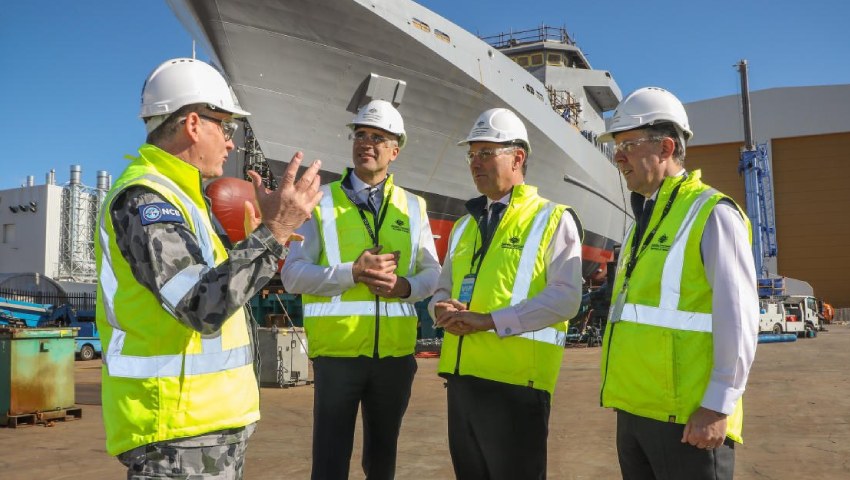Dependence on foreign suppliers would slow the delivery of Australia’s next-generation submarines, according to the Deputy Prime Minister.
To continue reading the rest of this article, please log in.
Create free account to get unlimited news articles and more!
Amid continued uncertainty over AIC targets for the Royal Australian Navy’s future SSN fleet promised under AUKUS, Deputy Prime Minister and Minister for Defence Richard Marles has touted the benefits of strengthening local shipbuilding capability.
During a visit to Osborne Naval Shipyard in South Australia, Minister Marles flagged the risks of dependence on overseas contractors for timely delivery, with the Nuclear Submarine Taskforce currently considering the US Virginia Class and UK Astute Class submarines.
“…If we want this capability to happen sooner rather than later, we have to build Australian capability right here,” he said.
“But if we are going to be solely reliant on a capability overseas, then we can expect those submarines are going to take a long time to be in our service and we need them as soon as possible.
“So, building Australian industrial capability within Australia — and I mean right here at Osborne — is fundamentally important to making sure that we acquire this capability as soon as possible, and that is going to be front and centre in terms of the way in which we are analysing this issue.”
His remarks come amid speculation over potential off-the-shelf orders, with former defence minister and leader of the federal opposition, Peter Dutton, recently backing two initial direct purchases of US-designed Virginia Class vessels by the end of the decade.
However, Minister Marles has rejected the idea, claiming delivery before 2030 is “extremely optimistic”.
The Minister is set to travel to the United States in the coming days to discuss the AUKUS agenda with counterparts.
“We want to look at how we can get [the submarines] here earlier,” he said.
“We want to obviously be looking at what option we ultimately run with, and we also need to be looking at plugging whatever capability gap arises and looking at the solutions to that.
“So, there is much to talk about with the United States and I'm very much looking forward to the opportunity of doing that.”
Following his tour of Osborne, the Deputy Prime Minister was also asked if the government would consider changes to the Hunter Class frigate program, given supposed issues relating to the design.
Minister Marles stressed the importance of the $45 billion project, describing the BAE Systems-built frigates as the future “centrepiece” of the Navy’s surface fleet.
“We will be working with BAE to make sure that this capability is delivered,” he said.
“It is critically important for the nation that that happens in a timely and effective way, and I do have confidence that that is what will occur.”
The Labor government has committed to launching a “posture review” in response to the changing geostrategic environment.
This would involve looking at the $270 billion investment in new capability with “fresh eyes”.
In an address to the Lowy Institute prior to the federal election, Prime Minister Anthony Albanese said the review would include:
- considerations of whether Tomahawk missiles can be fitted to the Collins Class submarines;
- reviewing progress of the Future Frigates project;
- exploring potential upgrades to weapons on the Arafura Class offshore patrol vessels or through additional Hobart Class air warfare destroyers; and
- advancing Australia’s strike weapons procurement program.
During his visit to Adelaide, Minister Marles, joined by Minister for Defence Industry Pat Conroy, met with industry representatives for a roundtable discussion covering a range of local defence projects.
“Australia’s geo-strategic environment underscores the need for a robust, sovereign and internationally competitive defence industry base,” Deputy Prime Minister Marles said.
“That is why the Australian government is committed to building a genuine, long-term partnership with defence industry, large and small, both locally and internationally.”
Minister Conroy said the government's focus on building sovereign capability would bolster local manufacturing, creating new work opportunities.
“The defence industry partnership is essential to developing the sovereign industrial base to provide the ADF the capabilities it needs, in the areas of greatest criticality, when it needs it,” Minister Conroy said.
“The Australian government seeks to maximise opportunities and remove barriers for Australian industry participation in Defence procurement.”
[Related: Marles concedes ‘extremely optimistic’ 2030 SSN delivery]

 Login
Login







